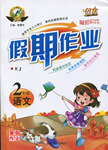题目内容
He is a strict and kind teacher, ______ my son loves and respects.
A. one B. the one who
C. which D. he who
练习册系列答案
 鸿图图书寒假作业假期作业吉林大学出版社系列答案
鸿图图书寒假作业假期作业吉林大学出版社系列答案
相关题目
题目内容
He is a strict and kind teacher, ______ my son loves and respects.
A. one B. the one who
C. which D. he who
 鸿图图书寒假作业假期作业吉林大学出版社系列答案
鸿图图书寒假作业假期作业吉林大学出版社系列答案